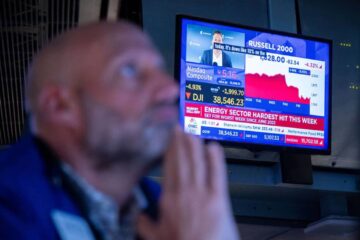Cable companies are not exactly famous for transparent pricing. In many cases, they advertise one price and you end up paying another, higher, price.
That’s largely because they don’t openly disclose the many fees that are added to your bill. When you see the bill, however, those fees are well documented.
Related: Another pharmacy chain closes stores, no bankruptcy planned
In recent months, the travel industry — at least parts of it — has moved into advertising all-in prices. Instead of not showing the taxes and added fees until you check out, all major cruise lines and many U.S. hotel chains are showing them up front.
When gas prices were high, a number of retailers tacked on fuel surcharges. Again, those were shown clearly so consumers could know what they are paying.
💰💸 Don’t miss the move: SIGN UP for TheStreet’s FREE Daily newsletter 💰💸
Now, the tariffs imposed on most foreign goods by President Donald Trump’s administration will push prices of many items higher. And retailers have every right to display the increases the tariffs cause when they break down pricing for customers.
One retail giant — which could have paved the way for all retailers to show the impact of tariffs — has decided to not do that.
Amazon customers will likely see higher prices without any disclosure as to why.
Image source: Mohssen Assanimoghaddam/picture alliance via Getty Images
Amazon backs off tariff disclosure plan
Amazon (AMZN) was reported by Punchbowl News to be considering disclosure of how the tariffs on each item increased its price. The company has said it considered this only for some goods in its low-cost Haul division, its alternative to China’s Temu and Shein, but not for the main website, and it ultimately rejected the idea.
But the company made clear that the tariff disclosure was not part of its plans after the Trump administration’s spokeswoman described the move as a “hostile and political act.”
It’s hard to see how the tariff-disclosure plan was a hostile and political act compared with showing taxes or a fuel surcharge, but the administration claim sent Amazon scurrying to appease Washington.
More Retail:
Huge retail chain closing more stores soon (locations revealed)Struggling drugstore chain announces second bankruptcyBeloved discount grocery chain has massive US plans
“Amazon said in a statement that even displaying prices on Amazon Haul was ‘never approved and [is] not going to happen,’ although the statement came after President Donald Trump’s high-profile call to Amazon founder Jeff Bezos,” RetailWire reported.
Had Amazon chosen to show the impact of tariffs on each sale, it would have given Americans a true picture of why prices had increased.
Retail experts share thoughts on Amazon tariff policy
Retail expert Neil Saunders was clear about what Amazon should do.
“Amazon has a right to display whatever it wants. It has a right to call out the impact of tariffs on its business and prices as it sees fit,” he posted on Retailwire. “This is a free nation in which the government is not the master of the people. The White House should not be throwing hissy fits because people or companies are exercising their right to free speech.”
Many others seemed to agree with him.
“Full tranparency is great (at least in theory): selective transparency, not so much, since it opens itself up to charges such as this. Of course what we should really be asking is ‘what’s wrong with a ‘hostile and political act’ (at least this one)?’… the tariffs themselves certainly are,” wrote Craig Sundstrom.
Warren Shoulburg was even more direct.
“Absolutely and shame on them for giving in to the reign of terror,” he wrote. “Consumers need to understand this is a tax on them and what exactly this farce is costing them. That will put an end to it pretty quickly. Is this the same Jeff Bezos who reinvented retail and now he’s afraid of a little man who doesn’t have a clue on how business works.”
Related: One of the biggest workforces in the US is facing mass layoffs
Brad Halverson says Amazon could have made a clear difference for its shoppers.
“In following what’s good for the customer, in saving them time and hassle, showing tariff line items have two benefits:
Customers have visibility into product costs, especially moving targets like added temporary costs until/if trade agreements are put in place. Customers who don’t want to pay tariffs can search for alternative products or sellers. Amazon can even display a tab for products “Made In America” as an alternative. In the end, it’s all about helping the customer shop.”
Bon Phibbs believes retailers broadly need to take a stand.
“It is important to see the actions of one man on a nation,” he said. “Every day this goes on with sound bites like “so they’ll get 2 dolls instead of 30” by the president is a slap against all retailers. Lawsuits should be filed before Main Street is decimated.”


